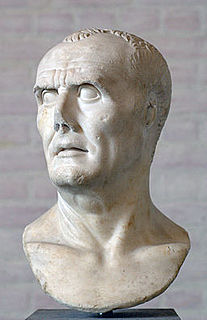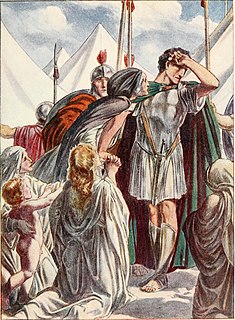
The gens Livia was an illustrious plebeian family at ancient Rome. The first of the Livii to obtain the consulship was Marcus Livius Denter in 302 BC, and from his time the Livii supplied the Republic with eight consuls, two censors, a dictator, and a master of the horse. Members of the gens were honoured with three triumphs. In the reign of Augustus, Livia Drusilla was Roman empress, and her son was the emperor Tiberius.

Lucius Cornelius Scipio Asiagenus, later known as Scipio Asiaticus, was a general and statesman of the Roman Republic. He was the son of Publius Cornelius Scipio and the younger brother of Scipio Africanus. He was elected consul in 190 BC, and later that year led the Roman forces to victory at the Battle of Magnesia.
The Third Macedonian War was a war fought between the Roman Republic and King Perseus of Macedon. In 179 BC, King Philip V of Macedon died and was succeeded by his ambitious son Perseus. He was anti-Roman and stirred anti-Roman feelings around Macedonia. Tensions escalated and Rome declared war on Macedon.
Titus Larcius was a Roman general and statesman during the early Republic, who served twice as consul and became the first Roman dictator.

The book History of Rome, sometimes referred to as Ab Urbe Condita Libri, is a monumental history of ancient Rome, written in Latin between 27 and 9 BC by the historian Titus Livius, or "Livy", as he is usually known in English. The work covers the period from the legends concerning the arrival of Aeneas and the refugees from the fall of Troy, to the city's founding in 753, the expulsion of the Kings in 509, and down to Livy's own time, during the reign of the emperor Augustus. The last event covered by Livy is the death of Drusus in 9 BC. 35 of 142 books, about 25% of the work, is still extant. The surviving books deal with the events down to 293 BC, and from 219 to 166 BC.

The gens Marcia, occasionally written Martia, was one of the oldest and noblest houses at ancient Rome. They claimed descent from the second and fourth Roman Kings, and the first of the Marcii appearing in the history of the Republic would seem to have been patrician; but all of the families of the Marcii known in the later Republic were plebeian. The first to obtain the consulship was Gaius Marcius Rutilus in 357 BC, only a few years after the passage of the lex Licinia Sextia opened this office to the plebeians.

Quintus Caecilius Metellus was a pontiff in 216 BC, aedile of the plebeians in 209 BC, curule aedile in 208 BC, magister equitum in 207 BC, consul in 206 BC, dictator in 205 BC, proconsul of Bruttium in 204 BC, and an ambassador at the court of Philip V of Macedon in 185 BC.

The gens Minucia was an ancient Roman family, which flourished from the earliest days of the Republic until imperial times. The gens was apparently of patrician origin, but was better known by its plebeian branches. The first of the Minucii to hold the consulship was Marcus Minucius Augurinus, elected consul in 497 BC.

Arruns Tarquinius, commonly called Egerius, was a member of the royal family of early Rome.
The Roman–Etruscan Wars were a series of wars fought between ancient Rome and the Etruscans. Information about many of the wars is limited, particularly those in the early parts of Rome's history, and in large part is known from ancient texts alone. The conquest of Etruria was completed in 265–264 BC.

The gens Postumia was a noble patrician family at ancient Rome. Throughout the history of the Republic, the Postumii frequently occupied the chief magistracies of the Roman state, beginning with Publius Postumius Tubertus, consul in 505 BC, the fifth year of the Republic. Although like much of the old Roman aristocracy, the Postumii faded for a time into obscurity under the Empire, individuals bearing the name of Postumius again filled a number of important offices from the second century AD to the end of the Western Empire.
The gens Atinia was a minor plebeian family at Ancient Rome, which came to prominence during the late Republic. No members of this gens ever attained the consulship, although several were praetors in the early second century BC, beginning with Gaius Atinius Labeo 195.
Spurius Larcius was one of the leading men of the early Roman Republic, of which he was twice consul. However, his greatest fame was won as one of the defenders of the Sublician bridge against the army of Lars Porsena, the King of Clusium.

The gens Pomponia was a plebeian family at ancient Rome. Its members appear throughout the history of the Roman Republic, and into imperial times. The first of the gens to achieve prominence was Marcus Pomponius, tribune of the plebs in 449 BC; the first who obtained the consulship was Manius Pomponius Matho in 233 BC.

The gens Lucretia was a prominent family of the Roman Republic. Originally patrician, the gens later included a number of plebeian families. The Lucretii were one of the most ancient gentes, and the second wife of Numa Pompilius, the second King of Rome, was named Lucretia. The first of the Lucretii to obtain the consulship was Spurius Lucretius Tricipitinus in 509 BC, the first year of the Republic.
The gens Manilia was a plebeian family at ancient Rome. Members of this gens are frequently confused with the Manlii, Mallii, and Mamilii. Several of the Manilii were distinguished in the service of the Republic, with Manius Manilius obtaining the consulship in 149 BC; but the family itself remained small and relatively unimportant.
Gnaeus Cornelius Lentulus served as quaestor of the Roman Republic in 212 BC, curule aedile and consul in 201 BC. His brother Lucius Cornelius Lentulus was also consul in 199 BC. Gnaeus was possibly the son of L. Cornelius L. f. L. n. Lentulus Caudinus, curule aedile in 209 BC, though the presence of the praenomen Gnaeus, along with the absence of the agnomen Caudinus, are opposed to this connection.
Publius Valerius Poplicola was a Roman politician and general in the mid 4th century BC who served as Roman Consul, Praetor, Dictator, and Magister Equitum during his career.
Publius Cornelius Arvina was a Roman politician and general who lived in the late 4th century and early 3rd century BC, who served as consul of the Roman Republic twice, and as censor once.
Lucius Veturius Philo was a curule aedile in 210 BC, praetor of Cisalpine Gaul in 209 BC, propraetor of the same province in 208 BC, consular legate in 207 BC, consul in 206 BC, and magister equitum in 205 BC. He was renowned for having been the first to announce to the Roman Senate the news of the great victory won over Hannibal Barca at the Battle of Zama, which ended the Second Punic War.









